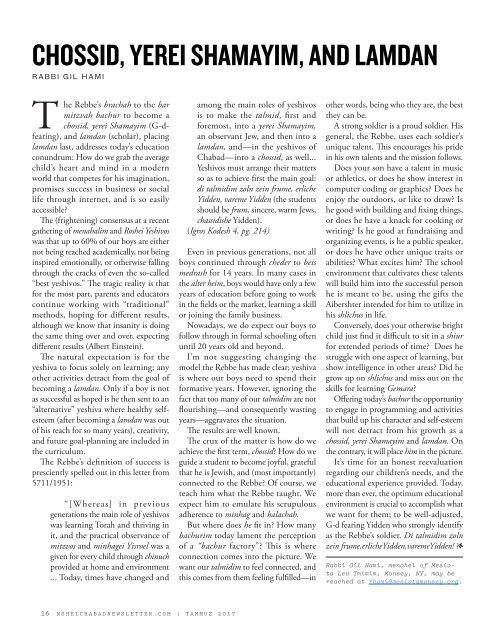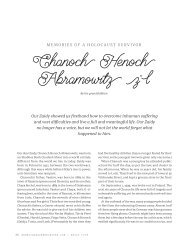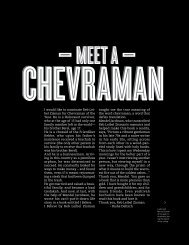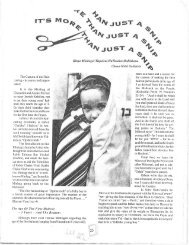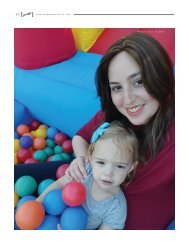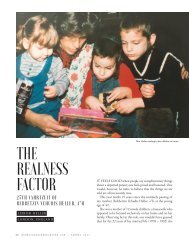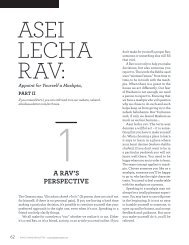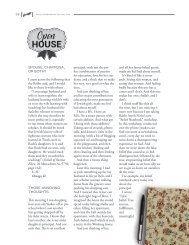Hami
You also want an ePaper? Increase the reach of your titles
YUMPU automatically turns print PDFs into web optimized ePapers that Google loves.
CHOSSID, YEREI SHAMAYIM, AND LAMDAN<br />
RABBI GIL HAMI<br />
The Rebbe’s brachah to the bar<br />
mitzvah bachur to become a<br />
chossid, yerei Shamayim (G-dfearing),<br />
and lamdan (scholar), placing<br />
lamdan last, addresses today’s education<br />
conundrum: How do we grab the average<br />
child’s heart and mind in a modern<br />
world that competes for his imagination,<br />
promises success in business or social<br />
life through internet, and is so easily<br />
accessible?<br />
The (frightening) consensus at a recent<br />
gathering of menahalim and Roshei Yeshivos<br />
was that up to 60% of our boys are either<br />
not being reached academically, not being<br />
inspired emotionally, or otherwise falling<br />
through the cracks of even the so-called<br />
“best yeshivos.” The tragic reality is that<br />
for the most part, parents and educators<br />
continue working with “traditional”<br />
methods, hoping for different results,<br />
although we know that insanity is doing<br />
the same thing over and over, expecting<br />
different results (Albert Einstein).<br />
The natural expectation is for the<br />
yeshiva to focus solely on learning; any<br />
other activities detract from the goal of<br />
becoming a lamdan. Only if a boy is not<br />
as successful as hoped is he then sent to an<br />
“alternative” yeshiva where healthy selfesteem<br />
(after becoming a lamdan was out<br />
of his reach for so many years), creativity,<br />
and future goal-planning are included in<br />
the curriculum.<br />
The Rebbe’s definition of success is<br />
presciently spelled out in this letter from<br />
5711/1951:<br />
“[Whereas] in previous<br />
generations the main role of yeshivos<br />
was learning Torah and thriving in<br />
it, and the practical observance of<br />
mitzvos and minhagei Yisroel was a<br />
given for every child through chinuch<br />
provided at home and environment<br />
... Today, times have changed and<br />
among the main roles of yeshivos<br />
is to make the talmid, first and<br />
foremost, into a yerei Shamayim,<br />
an observant Jew, and then into a<br />
lamdan, and—in the yeshivos of<br />
Chabad—into a chossid, as well...<br />
Yeshivos must arrange their matters<br />
so as to achieve first the main goal:<br />
di talmidim zoln zein frume, erliche<br />
Yidden, vareme Yidden (the students<br />
should be frum, sincere, warm Jews,<br />
chassidishe Yidden).<br />
(Igros Kodesh 4, pg. 214)<br />
Even in previous generations, not all<br />
boys continued through cheder to beis<br />
medrash for 14 years. In many cases in<br />
the alter heim, boys would have only a few<br />
years of education before going to work<br />
in the fields or the market, learning a skill<br />
or joining the family business.<br />
Nowadays, we do expect our boys to<br />
follow through in formal schooling often<br />
until 20 years old and beyond.<br />
I’m not suggesting changing the<br />
model the Rebbe has made clear; yeshiva<br />
is where our boys need to spend their<br />
formative years. However, ignoring the<br />
fact that too many of our talmidim are not<br />
flourishing—and consequently wasting<br />
years—aggravates the situation.<br />
The results are well known.<br />
The crux of the matter is how do we<br />
achieve the first term, chossid? How do we<br />
guide a student to become joyful, grateful<br />
that he is Jewish, and (most importantly)<br />
connected to the Rebbe? Of course, we<br />
teach him what the Rebbe taught. We<br />
expect him to emulate his scrupulous<br />
adherence to minhag and halachah.<br />
But where does he fit in? How many<br />
bachurim today lament the perception<br />
of a “bachur factory”? This is where<br />
connection comes into the picture. We<br />
want our talmidim to feel connected, and<br />
this comes from them feeling fulfilled—in<br />
other words, being who they are, the best<br />
they can be.<br />
A strong soldier is a proud soldier. His<br />
general, the Rebbe, uses each soldier’s<br />
unique talent. This encourages his pride<br />
in his own talents and the mission follows.<br />
Does your son have a talent in music<br />
or athletics, or does he show interest in<br />
computer coding or graphics? Does he<br />
enjoy the outdoors, or like to draw? Is<br />
he good with building and fixing things,<br />
or does he have a knack for cooking or<br />
writing? Is he good at fundraising and<br />
organizing events, is he a public speaker,<br />
or does he have other unique traits or<br />
abilities? What excites him? The school<br />
environment that cultivates these talents<br />
will build him into the successful person<br />
he is meant to be, using the gifts the<br />
Aibershter intended for him to utilize in<br />
his shlichus in life.<br />
Conversely, does your otherwise bright<br />
child just find it difficult to sit in a shiur<br />
for extended periods of time? Does he<br />
struggle with one aspect of learning, but<br />
show intelligence in other areas? Did he<br />
grow up on shlichus and miss out on the<br />
skills for learning Gemara?<br />
Offering today’s bachur the opportunity<br />
to engage in programming and activities<br />
that build up his character and self-esteem<br />
will not detract from his growth as a<br />
chossid, yerei Shamayim and lamdan. On<br />
the contrary, it will place him in the picture.<br />
It’s time for an honest reevaluation<br />
regarding our children’s needs, and the<br />
educational experience provided. Today,<br />
more than ever, the optimum educational<br />
environment is crucial to accomplish what<br />
we want for them; to be well-adjusted,<br />
G-d fearing Yidden who strongly identify<br />
as the Rebbe’s soldier. Di talmidim zoln<br />
zein frume,erlicheYidden,varemeYidden! 1<br />
Rabbi Gil <strong>Hami</strong>, menahel of Mesivta<br />
Lev Tmimim, Monsey, NY, may be<br />
reached at rhami@mesivtamonsey.org.<br />
16 NSHEICHABADNEWSLETTER.COM | TAMMUZ 2017


